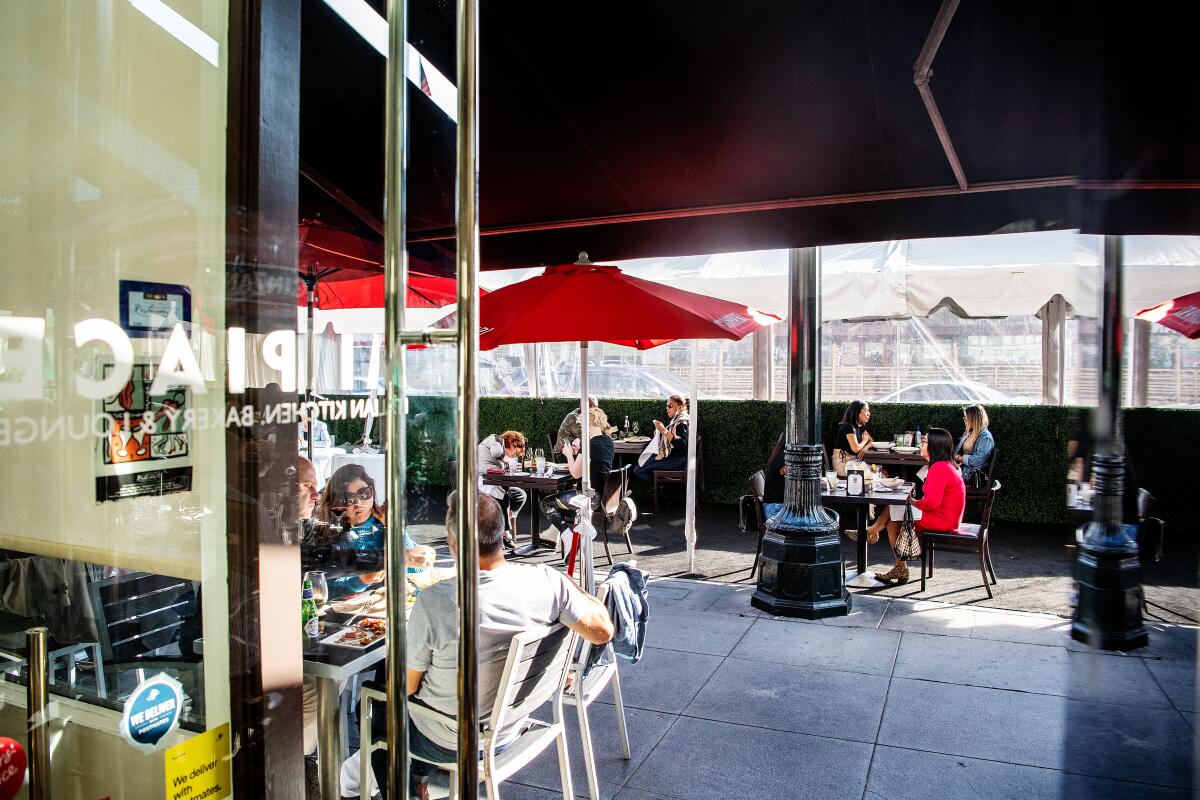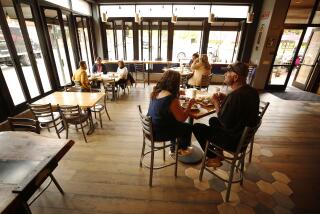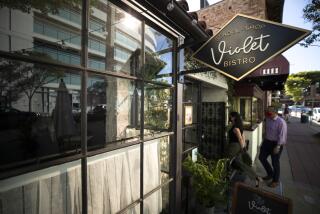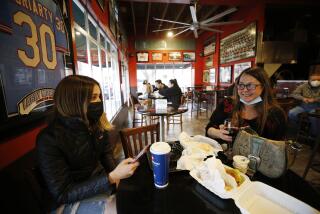What to expect from restaurants and bars in the yellow tier

On Thursday, Los Angeles County restaurants, bars, wineries, breweries and distilleries can reopen under the guidelines of California’s yellow tier, the least restrictive category in the state’s color-coded reopening plan. For some owners and operators, it means the first return to business in months.
The move allows bars that don’t serve food to reopen indoors for the first time since June 2020, and if all guests show proof of a negative result from a COVID test or full vaccination, that figure can increase from 25 percent capacity, or 100 people, to 37.5%.
Much like in the orange tier, the yellow tier still offers restaurants the capability of increasing indoor capacity from the current 50% to 75% with diners’ proof of negative test results or vaccination, and it offers wineries, breweries and distilleries the same option for the first time.
L.A. County’s new public health order, issued Wednesday, also changes table-spacing requirements at restaurants, bars, breweries and wineries. Previously mandated at eight feet of distance between parties, under the yellow tier tables can be spaced six feet apart.
“We have been waiting for this day for almost a year,” said Tyler Bell, a co-owner of the Gold Line bar in Highland Park. The bar does not serve food, so the Gold Line has mostly remained closed throughout the pandemic. With the move into the yellow tier, Bell says the bar could reopen indoors as soon as this weekend. Live entertainment is still banned indoors, so Gold Line won’t see the return of its live DJ sets yet, but the bar does house a 10,000-record vinyl collection, and bartenders will be able to play from those albums during service.
“It’s very exciting because it’s everything that we’ve missed in COVID,” Bell said. “It isn’t an algorithm on Spotify. It isn’t a poorly made drink at home. It isn’t a bad set of earbuds. It is everything that COVID kind of took away from us, and we are eager to get back as safely as we can. We’ll go within step.”
For Grant Smillie, co-owner and the executive director of L.A.’s Botanical Hospitality Group, the option for increased capacity is a welcome one — though the challenge of enforcing it is not.
“If someone says, ‘I left my vaccination card at home,’ do we nix your entire party?” Smillie asked. “What’s the enforcement look like, from a compliance perspective, in the event that you did seat 75[%]? Are you walking around to their tables and asking them to produce proof while they’re in your dining room? That’d be just ridiculous.”
Botanical Hospitality Group maintains West Hollywood cafe Strings of Life and rooftop bar L.P., both of which have been operating with outdoor dining for months. Their full-service restaurant, E.P., sits one floor below L.P. and has been closed for nearly the entirety of the pandemic, during which the team planned a complete rebrand: When E.P. reopens on Monday, the former Pan-Asian concept will have switched to an eclectic Modern-American menu with entirely new culinary focus, chef, furniture, design and paint job.
The restaurant group waited until word that L.A.’s indoor dining capacities could increase to at least 50% and then started to retrofit the space (the new menu has been in development since 2020). Under the yellow tier, they plan to reopen E.P. with at least 50% capacity, and potentially extend to 75%, which could help compensate for a year of financial losses.
“Any restaurant that’s made profits during this time is a unicorn, in my eyes, or it had a really robust to-go menu in the first place,” Smillie said. “So, we’ll probably look to do that [75%] if we certainly feel like we can accommodate the guests.”
The move to the yellow tier allows a number of other sectors to increase indoor capacities as well, including gyms, amusement parks, hotels, museums and indoor playgrounds.
This week, California recorded the lowest COVID-19 hospitalization rate since the beginning of the pandemic. If hospitalization rates remain low and stable and vaccines remain in ample supply, Gov. Newsom’s recovery phase can move beyond the color-coded system to a statewide reopening targeted for June 15.
Still, officials stress vigilance.
“While transmission is low here, we are still in the middle of a pandemic, variants of concern are circulating, and there is still widespread transmission occurring in other parts of the world,” Barbara Ferrer, the county health director, said Tuesday. “We know how to get our rates low; now we must keep them low by getting vaccinated and continuing to follow the guidance. Our gains are fortified as more people are vaccinated.”
More to Read
Eat your way across L.A.
Get our weekly Tasting Notes newsletter for reviews, news and more.
You may occasionally receive promotional content from the Los Angeles Times.










